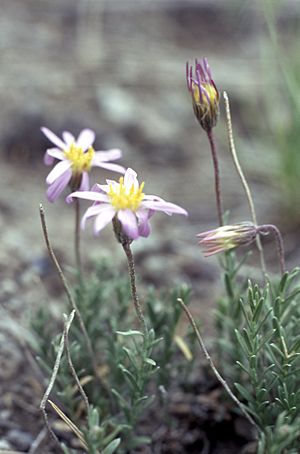Lava aster facts for kids
Quick facts for kids Ionactis alpina |
|
|---|---|
 |
|
| Scientific classification | |
| Kingdom: | |
| (unranked): | |
| (unranked): | |
| (unranked): | |
| Order: | |
| Family: | |
| Genus: |
Ionactis
|
| Species: |
I. alpina
|
| Binomial name | |
| Ionactis alpina (Nutt.) Greene 1897
|
|
| Synonyms | |
|
|
Ionactis alpina is a type of plant often called the Lava Ankle-aster or Lava Aster. It used to be known as Aster scopulorum. This plant grows naturally in the western parts of the United States, from California all the way to Montana. You can usually find it in dry areas.
About the Lava Aster
The Lava Aster is a perennial herb, which means it's a plant that lives for many years. It grows from a thick, woody base called a caudex and has many small, thin roots.
What it Looks Like
The plant has a short stem that usually stands upright. This stem can grow up to about 12 centimeters (or 4.8 inches) tall and is covered in tiny hairs.
Stems and Leaves
Most of the plant's small leaves are found near the bottom of the stem. They are about 1 centimeter (0.4 inches) long. These leaves can be oval or shaped like a spear, with a pointed tip. They are a bit stiff and also covered in hairs.
Flowers and Seeds
The Lava Aster produces single flower heads at the top of its stem. These flower heads have special protective leaves called phyllaries, which are purple-green.
Each flower head has 7 to 21 thin, petal-like flowers called ray florets. These can be blue, purple, or sometimes white. In the center of the flower head, there are 19 to 50 long, yellow disc florets. After the flower blooms, it produces a hairy fruit called an achene, which contains the seeds.
See also
In Spanish: Ionactis alpina para niños
 | Kyle Baker |
 | Joseph Yoakum |
 | Laura Wheeler Waring |
 | Henry Ossawa Tanner |

